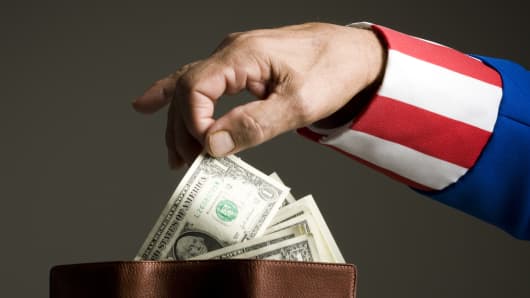Some Democrats in Congress are seeking to include an extension of the $120 billion payroll tax cut in negotiations over the looming "fiscal cliff," shaking what had appeared to be a bipartisan consensus to allow the measure to expire as planned at the end of the year.
The move could complicate the budget talks due to begin after the November presidential election and alarm rating agencies — since the sunset of the payroll tax measure is the only big provision that both parties seem comfortable directing towards deficit reduction.
But it could ease worries among some economists of the hit to growth and consumption that would occur if the payroll tax cut lapsed, reducing disposable income for many middle-class working families across the country.
The payroll tax cut — reducing the taxes on wages used to fund the social security pension scheme from 6.2 percent to 4.2 percent — was introduced in December 2010 to be in place for just one year.
But it was extended for an additional year after a series of fraught negotiations between Congress and the White House.
In February, Tim Geithner, Treasury secretary, told the Senate budget committee it would be the last time. "This has to be a temporary tax cut," Mr. Geithner said. "I don't see any reason to consider supporting its extension."
Meanwhile, Republicans on Capitol Hill who were never enamored with the payroll tax cut — Paul Ryan, the vice-presidential nominee, even called it "sugar-high economics" in June 2011 — have been satisfied that it should revert to normal levels.
The payroll tax cut is one of the biggest elements of the so-called "fiscal cliff" — which could remove $600 billion from the U.S. economy in 2013 unless Congress acts to avert it.
The others are the expiration of Bush-era tax rates on income, capital gains and dividends, as well as $100 billion in automatic spending cuts, including a big hit to the Pentagon budget. As preparations for the "fiscal cliff" negotiations move into high gear, all sides know they have to strike a balance between limiting the economic damage and offering some downpayment towards deficit reduction.
But Democrats on Capitol Hill are showing signs of balking at the notion that the payroll tax cut should be sacrificed to help solve the U.S.'s debt problems. Their top objective still remains to force Republicans to accept the expiration of Bush income tax cuts for the rich, while extending middle-class income tax cuts.
"[The payroll tax cut] could potentially be in the mix, just not at the top of the priority list," said one Democratic aide in the Senate. "There's not necessarily a big push at this time to extend it . . . in the Senate."
Chris Van Hollen, the top Democrat on the budget committee in the House of Representatives, told C-SPAN television at the weekend: "I don't think anyone thinks we should permanently extend the payroll tax cut but, given the situation we're in, I don't think that should be taken off the table."
Republicans scoffed at the idea. A spokeswoman for Orrin Hatch, the top Republican on the Senate finance committee, said he "believes the payroll tax, which was intended to be temporary, should expire at the end of the year. I'd also point out that there has been strong, bipartisan support to let that tax provision expire."
But it was still unclear whether this would become a big bone of contention in November and December. Democrats are being tugged in both directions. Larry Summers, the former Treasury secretary, and other Democratic economists have been saying that this was the wrong time to raise payroll taxes. But the AARP, an influential senior group, is lobbying in favor of expiry, on the grounds that it would set a bad precedent for the funding of social security.
However, JPMorgan downgraded its forecast for U.S. economic growth early next year, partly as a result of its expectation that the payroll tax cut would run out. Michael Feroli, a senior economist at the Wall Street bank, said growth would be 1 percent in the first quarter, down from 1.5 percent, and 1.5 percent in the second quarter, down from 2.25 percent.


